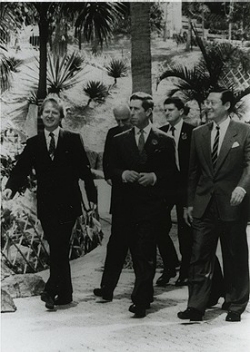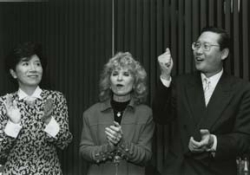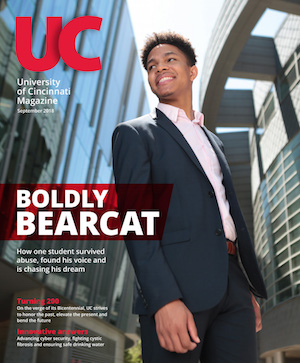UC alumnus Peter Woo a world leader
by Deb Rieselman

Peter Woo, A&S ’70, HonDoc ’94, (right) discusses issues with Britain's Prince Charles when was the featured speaker at the Prince of Wales Business Leaders Forum.
Prince Charles, Henry Kissinger, Alexander Haig, China' s Premiere Li Peng, George Bush Sr. and Ted Turner. The list is impressive, but only a small portion of the rulers and business leaders with whom Hong Kong businessman Peter Woo has associated.
In the late '60s, Woo' s associates were fraternity brothers, campus leaders and athletes at UC. Today, many of them still work and vacation with him, but his roster has expanded to include names easily affiliated with the world 's most influential businessmen.
While grandiose, the list is far from surprising for those who know Woo best. Former classmates have come to expect extraordinarily impressive things from an individual who once made such remarkable strides on campus.
Exactly 30 years ago, Woo came to Greater Cincinnati from Hong Kong, knowing no one here but cousins in Ft. Thomas, Ky., who encouraged him to attend UC. As the only Asian male on campus, he struggled with the intricacies of American English and Western ways of life, say his old college friends.
Yet within five short years, he was clearly one of the most popular and respected men on campus. In 1969, he was the varsity cheerleader and intramural champion whom the seniors elected class president, and by graduation nine months later, he had achieved the honor of valedictorian.
"Respected" and "popular" are two hard-earned adjectives that have remained with Woo. On one hand, his accomplishments continue to win respect around the world. And at the same time, he evokes the kinds of emotions in his friends that brought hundreds of them — even from as far away as Seattle, New York, Boston and Cleveland to campus in the fall of 1994 to see him.
The reason for their reunion was memorable: UC awarded Woo an Honorary Doctor of Letters degree. "You have ably demonstrated through your steadfast leadership that you exemplify the aims and ideals of the University of Cincinnati," said UC President Joseph Steger in making the presentation. "It is rewarding to those involved in your formative experiences to observe how thoroughly you have fulfilled the promise you displayed as you pursued your studies."

''Fulfilling his promise" is putting it simply. In the last two decades, Woo has served as chairman of the $13 billion Hong Kong conglomerate Wheelock & Co. and chairman of its chief subsidiary Wharf Holdings. He has played a key role in China' s economic development, by investing in transportation, communications and infrastructure, as well as attracting foreign investors.
Around the world, government leaders and the media frequently seek Woo's advice and guidance. And in the process, he is quick to promote China's potential, especially when combined with the economic power of Hong Kong.
The accomplishments his company can claim include: currently building Hong Kong's first cable television system; operating Hong Kong's historic Star Ferry, tram system and the Cross Harbor Tunnel; owning more than 10 million square feet of office and retail space in Hong Kong, including the new fully leased 2-million-square-foot Times Square property; and being the first company in Hong Kong to receive a long-term debt rating of A from Standard & Poor's (which is the highest rating possible since the government has an A rating).
Although his professional schedule is demanding, Woo balances charitable and civic responsibilities, as well. He is chairman of the Prince of Wales. Hospital's governing committee, council chairman of the Hong Kong Polytechnic University, founder and chairman of the Environment and Conservation Fund Committee, vice president and chairman for Asia Prince of Wales Business Leaders Forum, board member of both the National Westminster Bank and the International Board of Chemical Bank, a trustee of Columbia University, an adviser to the Sichuan Provincial People's Government and Hong Kong Affairs adviser to the People's Republic of China.
Friends speak in awe of how admirably he wears the titles "businessman," "entrepreneur," "statesman" and ''banker.'' But he places none of them over the title "family man," they say - always making time for his wife, Bessie, and their three children.
His ambitious drive for excellence has earned him Hong Kong's highest honor, Justice of the Peace, and Belgium's highest honor, the Order of the Cross of Officers in the Order of Leopold. Yet despite the magnitude of those honors, on Sept. 27, he genuinely expressed his gratitude at adding the UC Honorary Doctor of Letters degree to the list.
The reason for his staunch university pride dates back to the spring of '65 when he became the first Asian to join Delta Tau Delta fraternity. It was a small indication of the enthusiasm and involvement that he would invest in UC during his years on campus.
By graduation in '70, he had chaired both the fraternity intramural program and the all-campus Student Intramurals, led the fraternity's table tennis and badminton teams to multiple championships, helped his frat take the All Sports Trophy three years in a row, led the volleyball team to three consecutive championships and coached a dormitory football team, after serving as its captain and winning an intramural championship. As if that were not enough, he was also a resident adviser and a member of Omicron Delta Kappa, Cincinnatus, Men of Metro, Internat, the A&S Tribunal and the Men's Advisory.
In light of his lengthy list of involvements, his memories of campus are what one might expect. "What I got most out of school was working with people and leadership opportunities," he says. "It is up to you to take those opportunities or not. I was lucky enough to be in the position to do a lot of things that were beyond the academic side."
Peter was born in Shanghai, China, and raised in Hong Kong. In high school, he excelled in swimming, basketball, volleyball and hockey. He wanted to attend college to study architecture - a distinguished profession that had led his father to a prominent career.
Coming to UC, however, had as much to do with family ties as with UC having a respected School of Architecture. Woo's cousin in Northern Kentucky, Margaret Tcheng, played the decisive hand. "He was an only son, and his parents wouldn't let him come here by himself," she recalls. "So he lived with us at first. Then when he moved on campus, we would still pick him up and take him home on weekends."
By the end of his freshman year, he fit in comfortably. He had joined the fraternity and developed a strong network of friends, many who have remained close all these years. He had also decided upon a new major — physics.
Four years later, he graduated with a 3.7 GPA and enrolled in Columbia University in New York. In one more short year, he had earned his MBA, and Chase Manhattan Bank quickly snatched him up as a banker.
While living in New York, his personal life also made strides. There he met Bessie Pao, second daughter of the Hong Kong shipping magnate Sir Yau-kong Pao, and married her in 1973. When Chase Manhattan transferred him to Hong Kong that same year, it was a most fortuitous trip though in an unsuspecting way.
In 1975, Bessie's father, Sir Y.K, as he was called, prevailed upon Woo to join the family business, World Wide Shipping. Woo wrapped up his banking responsibilities and took a short shipping course at the British Maritime Institute before joining Pao's enterprise.
Woo had no job description and a salary that was less than he had been making at Chase, but neither slowed him down. He put his expertise to work developing a corporate financial system and, within two years, was named finance director. His cash flow policies proved to be remarkable; in a short time, they sustained the company through an upcoming industry recession.
In 1978, the 32-year-old Woo again demonstrated his unique understanding of business when he worked closely with Sir Y.K. to stage a successful takeover of the Hong Kong & Kowloon Wharf & Godown Co. In 1982, he was named chief operating officer of Wharf. Then in ' 85, he played a key role in the takeover of Wheelock Marden, a high-profile deal that instilled new vigor into a shaky market.
Sir Y.K. retired in '86, and Woo was named chief executive officer of both Wharf and World Wide, which later changed its name to Wheelock, a historic trading name in China. By that time, the Pao empire was quite different than the shipping business Woo had joined 11 years earlier. Woo's expansion and transformation of the corporation led it into infrastructure, transportation and real estate. Corporate holdings included 31 different companies with a market value that equaled 10 percent of the total value of the Hong Kong stock exchange.
Since then, the business has further evolved to include communications and hotels, with acquisition of the U.S.-based Omni Hotel chain in the late ' 80s. In '93, Wheelock's earnings were up 33 percent and its revenue up 43 percent. Over the last 16 years, Wharf alone has averaged an annual profit growth of 27 percent.
"Peter has emerged as a leader in a new generation of truly global business executives," says former fratemity roommate Mike Ullman, BusAd '69. In '84, Woo recruited Ullman, who recently resigned as chairman of R.H . Macy & Co., to take over for him as chief operating officer of Wharf. "I went to work for him during an interim period in his life," recalls Ullman. "He had just become chairman, and I took over his previous responsibilities.
"He has a brilliant financial mind and was running 15 different operations. Yet he was very patient and supportive of me.
"In the '70s, when Y.K. was becoming a shipping magnate, much of the financial thinking was Peter's. Peter is very market-oriented, which is unusual for Asians. He took American retailing and marketing principles back with him.
"Academically, Peter is very intelligent," Ullman continues. "He took nothing for granted and always invested in a positive sense. He didn't cut comers. He's very decisive - willing to see an opportunity, then step up and take it."
Today, Woo's emphasis is on trying to get the rest of the world to step up and explore the financial opportunities in China. "The opening of the border with China in 1978 gave Hong Kong a new lifeline in trade," he says, launching into his favorite subject. "Hong Kong has a key role to play in China's growth, as a merchant city, providing marketing and investment banking. Fifty million overseas Chinese are the entrepreneurs and merchants who act as catalysts in this development.
"The economic environment today is so much more complex than it was in the good old days when I graduated from this university. Not only must we be on top of what happens within our own countries to succeed, we must move across borders into other regions and economies so that we are not left out from the new 'borderless' world of global trade, technology, communications and investment.
"In the macro trade picture, China, Taiwan and Hong Kong can be considered as a trio. In world trade terms, this trio ranks third behind the U.S. and Germany. I think the world believes that the right move is to bring China into the international trading community.
"The U.S. has technology, resources and production know-how. But the East has tremendous manufacturing advantages. In today 's climate of fierce international trade competition, we should take advantage of the unprecedented possibilities that lie in the new borderless movement of technology, information and capital around the world."
In hooding Woo at the September ceremony, President Steger remarked that he is known "as an ambassador of free enterprise" throughout the world. "At the same time," he added, "you have shown that an abiding concern for the welfare of others is at the core of your character. You have served your alma mater steadfastly and continually over many years, unselfishly answering the call to leadership. This university has benefited immeasurably from your astute counsel."
That "abiding concern for the welfare of others" was most obvious when Peter and Bessie donated $120 million to the Prince of Wales Hospital in 1992 to build a cancer center. The seven-story center, with separate facilities for adults and children, is due to open shortly.
Those who know Woo have tried to characterize him with many adjectives and noun s. The most common ones include "charitable," "intelligent," "athletic" and "a leader." Among the more descriptive ones, though, are "insightful, demanding, expecting fairness, shrewd, introspective, powerful, refined, perfectionist and having a passion for work."
Woo refrains from discussing himself, but relates his achievements in terms of others. "You may have the ideas, the vision," he says, "but it is your ability to motivate and interrelate with people that matters, so that your ideas can be accepted, supported and implemented. No one man can do everything. There are only 24 hours in everyone 's day. The ability to create the future comes through people."
And what individual traits are most important for a successful businessperson? "You have to have ability and work hard," he says, "and be loyal to yourself, your objectives and goals. Unless you can see where you are going, yon can't be a success. You can't manage by the day."
In effect, Peter Woo just described himself.
Thirty years ago, however, he could not envision where he was headed. "I had no idea of a career at that time," he admits. "I wanted an education and a chance to grow up and mature. I got to work with people with no strings attached.
"College life is an opportunity to grow and develop yourself. In school, you don't owe anybody anything. No one owes you anything, either, so nothing is given to you on a plate. You get what you earn." Peter Woo has earned much. But on Sept. 27, 1994, after shaking hundreds of hands, facing dozens of camera flashes and squeezing in time for a writer' s interview, he earned the chance to enjoy his fraternity brothers at a Delta Tau Delta reunion at the Faculty Club. There he wrapped his arms around former classmates, sang the old college songs and, after some prodding, even led a cheer.
It was the Peter Woo everyone remembered. Close friend Tom Humes, BusAd '71,MA (A&S) '77, president of Cincinnati's Great Traditions Land and Development Co., says it is the Peter Woo he often sees. "He can be talking to Prince Charles one minute, turn and talk to you the next, and relate to both perfectly," he says. "He's very down to earth."
That is the way Mike Ullman sees him, too. "He is very personable," Ullman says. "While he has considerable resources and family wealth, he does not live that way. He has an unpretentious life style.
"I have only a handful of friends whom I would consider lifelong. He is on my list, and I'm sure I'm on his. He's a true friend in every sense of the word."
Furthermore, Woo continues to remain a true friend for the rest of the university community, as well as a role model for alumni and current students. "With all of his accomplishments and business demands," Ullman says, "Peter has always kept up his long-standing DC relationship. He's a classic example of how important a quality university experience can be in a young person's development-academically, socially and, most importantly, in the development of the person' s character."

 Past Issues
Past Issues